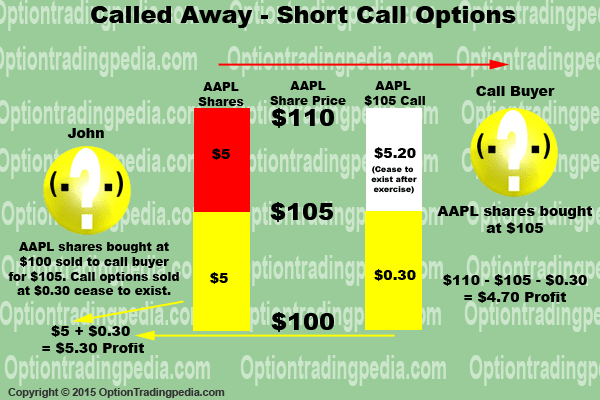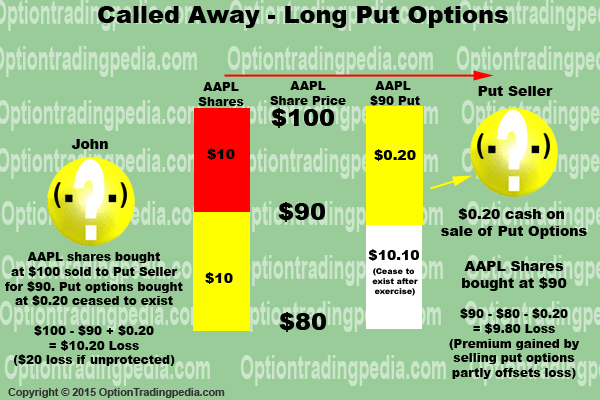What Happens When Your Stocks Get Called Away in Options Trading?
Called Away - Definition in Options Trading
When stocks you own are involuntarily sold due to short call options or long put options that were exercised on those stocks.
Called Away - Introduction
In Options Trading, when your stocks are "Called Away", it means that those stocks are sold to buyers of call options you wrote at the strike price you wrote those call options at. This scenario typically happens to Covered Call or Deep In The Money Covered Call traders who own stocks and write call options on the stocks they own or options traders who buy put options to protect the value of their stocks during a bear market. Learn about how "Called Away" works and how it affects your options trading.
Why Do Stocks Get Called Away?
When your short call options or long put options are exercised while you own the underlying stock, the underlying stock changes hands. Stocks that are sold to buyers of call options or sellers of put options at the strike price of those options are known as being "Called Away".
Short Call Options
When you write call options (Sell to Open), you give the buyer of these call options the right to buy your stocks at the strike price of the call options sold. Options traders typically do that when they do a Covered Call or Deep In The Money Covered Call options strategy. When the buyer of these call options decides to buy the underlying stock at the strike price of those call options and therefore exercises these call options, your stocks are sold to the buyer of your call options at the strike price of the call options. This is how the term "Called Away" comes about, taken away due to call options. Stocks typically get "Called Away" when the stock rallies past the strike price of the short call options near expiration in a Covered Call strategy.
Called Away Example - Short CallAssuming John owned 100 shares of AAPL. When AAPL was trading at $100, he decided to perform a Covered Call write on his AAPL shares by writing 1 contract of $105 call options. AAPL rallies unexpectedly to $110, bringing the call options he wrote in the money. Subsequently, as expiration nears, his stocks got "Called Away" and sold at $105. He received cash for the shares sold and the call option sold cease to exist. |
Long Put Options
Short call options are not the only way stocks can get "Called Away". This can also happen when you buy put options on your stocks as "Protective Put". When you buy put options (Buy to Open), you obtain the right to sell your stocks at the strike price of the put options. This means that no matter how low the price of the stock goes down to, you always get to sell your stock at the higher price, which is the strike price of the put options. When the price of the stock really drops past the strike price of the put options, the put options becomes "In The Money" and susceptible to "Early Assignment", which is automatic exercise of those put options on a random basis by the options exchange. When that happens, the stocks are sold at the strike price of the put options, hence "Called Away".
Called Away Example - Long PutAssuming John owns 100 shares of AAPL. When AAPL was trading at $100, he decided to perform a Protective Put on his AAPL shares by buying 1 contract of $90 put options so that if the price of AAPL drops down below $90, the appreciation on the price of the put options cover the loss on the price of AAPL. |
What Happens When Stocks Get Called Away in a Covered Call?
When stocks get called away in a Covered Call, the stocks in your account are sold at the strike price of the options (instead of the current market price of the stock). The options become exercised and ceased to exist, allowing you to pocket the full initial extrinsic value as profit.
What Happens When Stocks Get Called Away - Covered CallAssuming John owns 100 shares of AAPL. When AAPL was trading at $100, he decided to perform a Covered Call write on his AAPL shares by writing 1 contract of $105 call options at $0.30. AAPL rallies unexpectedly to $110, bringing the call options he wrote in the money. Subsequently, as expiration nears, and his stocks got "Called Away" and sold at $105. The call options that were written has also rallied to $5.20 at the time of exercise. The call options that were exercised ceased to exist, allowing John to pocket the initial extrinsic value of $0.30 x 100 = $30 The buyer of the call options gets shares of AAPL bought at $105 for an instant profit per share of $110 - $105 = $5 but loses the entire call option value of $5.20, including the $0.30 used towards the purchase for a net profit per share of $5 - $0.30 = $4.70. |

What Happens When Stocks Get Called Away in a Protective Put?
When stocks get called away in a Protective Put, the stocks in your account are sold at the strike price of the options (instead of the current market price of the stock). The put options become exercised and cease to exist. This means that you lose the initial investment you invested in the put options and all accrued value in exchange for selling the stock at the higher price (strike price of the put options).
What Happens When Stocks Get Called Away - Protective PutAssuming John owns 100 shares of AAPL. When AAPL was trading at $100, he decided to perform a Protective Put on his AAPL shares by buying 1 contract of $90 put options at $0.20 so that if the price of AAPL drops down below $90, the appreciation on the price of the put options covers the loss on the price of AAPL. John's AAPL shares get sold at $90 (strike price of the put options) even though it was worth only $80 in the market, allowing him to pocket $9000. The put options that were exercised ceased to exist, John loses the money he invested in the put options $0.20 x 100 = $20 Net effect, John is left with $9000 - $20 = $8980 cash which is a loss of only $100 - $90 + $0.20 = $10.20 per share. Without protection from the put options, John would have lost $100 - $80 = $20 per share so far. |

How Does Stock Being Called Away Affect My Options Trading?
Alot of options traders hate the idea that their stocks can get called away in a Covered Call. However, due to the fact that all extrinsic value disappears and immediately becomes earned profit when the call options are exercised, profit that is due to be earned only during expiration is earned immediately, allowing you to buy the stock again and write more call options on the same expiration month, making an additional profit.
Stocks that are being called away in a Protective Put are being sold at a higher price than the market, serving the protective insurance function that the put options were bought for in the first place. You can then either buy more of the stock at the lower price or simply hold cash if the outlook is not so favorable.

|
Can't Decide Which Options Strategy To Use? Try our Option Strategy Selector! |
| Javascript Tree Menu |
Important Disclaimer : Options involve risk and are not suitable for all investors. Data and information is provided for informational purposes only, and is not intended for trading purposes. Neither www.optiontradingpedia.com, mastersoequity.com nor any of its data or content providers shall be liable for any errors, omissions, or delays in the content, or for any actions taken in reliance thereon. Data is deemed accurate but is not warranted or guaranteed. optiontradinpedia.com and mastersoequity.com are not a registered broker-dealer and does not endorse or recommend the services of any brokerage company. The brokerage company you select is solely responsible for its services to you. By accessing, viewing, or using this site in any way, you agree to be bound by the above conditions and disclaimers found on this site.
Copyright Warning : All contents and information presented here in www.optiontradingpedia.com are property of www.Optiontradingpedia.com and are not to be copied, redistributed or downloaded in any ways unless in accordance with our quoting policy. We have a comprehensive system to detect plagiarism and will take legal action against any individuals, websites or companies involved. We Take Our Copyright VERY Seriously!
Site Authored by